Archived Storm Damage Blog Posts
How to Protect Your Business in Sanibel, Florida, from Storm Damage?
2/11/2025 (Permalink)
 We restore commercial storm damage 24/7 in Lee County.
We restore commercial storm damage 24/7 in Lee County.
Our local Sanibel/Captiva Island/Fort Myers Beach teams are trusted storm damage restoration leaders. Sanibel, Florida, is no stranger to extreme weather, particularly during hurricane season. With its coastal location and frequent storms, homeowners must take proactive measures to minimize storm damage. One of the most significant threats during storms is wind and water damage, which can impact roofs, windows, and structural integrity.
For businesses, it's crucial to start with a well-maintained roof. Storms, especially with heavy rain, can easily tear off shingles or cause leaks. Regular inspections can help identify weak points in your roof, preventing significant water intrusion.
To reduce the risk of broken glass and water damage, windows and doors should be reinforced or covered with storm shutters. While flooding isn't as common in Sanibel as in other coastal areas, persistent heavy rain can still lead to significant water accumulation, especially in lower-lying areas.
Finally, ensure your drainage systems—such as gutters and downspouts—are clean and clear. Clogged gutters can cause water to back up and spill into your home, leading to costly damage.
By preparing in advance, businesses can reduce the risk of extensive damage during severe weather, keeping their properties safe and sound.
Call Us Today!
SERVPRO® Team Zubricki is proud to be SERVPRO’s Franchise of the Year 2024.
When your commercial business or home needs storm damage restoration services, our local Sanibel/Captiva Island/Fort Myers Beach teams are Here to Help®. Contact us today.
SERVPRO® franchises are independently owned and operated.
Protecting Sanibel, Florida, Hotels from Storm Damage?
2/4/2025 (Permalink)
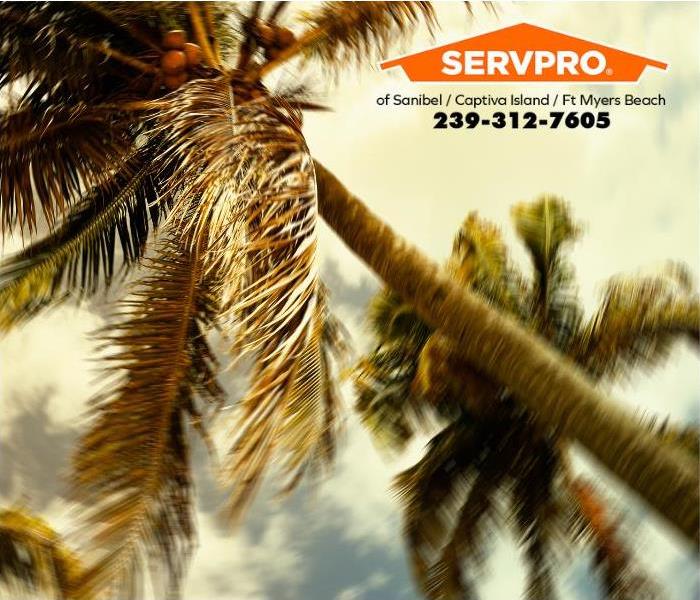 We are commercial storm damage restoration leaders in Lee County.
We are commercial storm damage restoration leaders in Lee County.
Our local Sanibel/Captiva Island/Fort Myers Beach teams respond to storm damage emergencies 24 hours a day, 365 days a year in Sanibel. Powerful storms can wreak havoc on commercial properties, particularly hotels.
High winds, heavy rain, and flying debris can cause significant structural damage, from broken windows to roof leaks. For hotel owners, quick action to mitigate damage is critical to preventing costly secondary issues like mold growth and water intrusion.
The first step in storm damage mitigation is securing the property. Broken windows and exposed roofs should be covered with tarps or boards to prevent further water entry. Standing water needs immediate extraction to avoid structural weakening and mold infestations. Additionally, debris removal is crucial to restore safe access to the property.
Hiring our team of professionals ensures thorough mitigation and repair. We identify hidden damage, such as compromised electrical systems or unseen water pooling, that may worsen if left untreated. We also expedite the cleanup process, minimizing disruptions to hotel operations.
Our prompt mitigation efforts can significantly reduce repair costs and downtime, preserving the reputation and profitability of Sanibel hotels. Preparing ahead of storms and acting quickly when they occur are essential for safeguarding both the property and the guest experience.
Call Us Today!
SERVPRO Team Zubricki is proud to be SERVPRO’s Franchise of the Year 2024.
When your commercial business or home sustains storm damage and needs storm damage restoration services, our local Sanibel/Captiva Island/Fort Myers Beach teams are Here to Help®. Contact us today.
SERVPRO® franchises are independently owned and operated.
Rare January Storm Causes Devastating Damage in Sanibel, Florida?
1/14/2025 (Permalink)
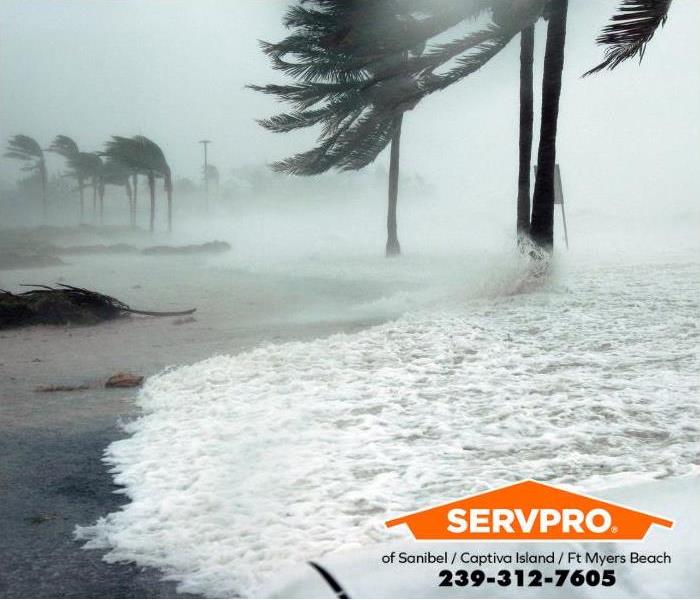 We are commercial storm damage restoration leaders in Lee County.
We are commercial storm damage restoration leaders in Lee County.
Our local Sanibel/Captiva Island/Fort Myers Beach teams are highly trained and certified to restore commercial storm damage. Sanibel, FL, is no stranger to severe weather, but the January storm of 2014 stands out for its destructive impact. While winter storms in Florida are rare, this one brought unusually high winds and torrential rain, leaving a trail of damage across the island.
Coastal flooding was among the most significant issues caused by the storm. High tide and heavy rainfall overwhelmed low-lying areas, damaging homes, businesses, and infrastructure. Many properties suffered water intrusion, with saltwater causing additional damage to foundations, electrical systems, and landscaping.
Strong winds uprooted trees and downed power lines, leaving residents without electricity for days. Beach erosion was another significant consequence, with waves washing away large sections of sand, affecting local ecosystems and tourism.
Sanibel’s response to the storm highlighted the importance of preparedness. Local efforts to reinforce coastal defenses and improve drainage systems have helped mitigate future storm risks. However, this storm remains a sobering reminder of how even rare winter weather events can cause extensive damage to Florida’s coastal communities.
Call Us Today!
SERVPRO® Team Zubricki is proud to be SERVPRO’s Franchise of the Year 2024.
When your commercial business or home is damaged by a storm, our local Sanibel/Captiva Island/Fort Myers Beach teams are Here to Help. ® Contact us today.
SERVPRO® franchises are independently owned and operated.
Commercial Storm Damage in Captiva, Florida – A Hurricane’s Aftermath?
1/6/2025 (Permalink)
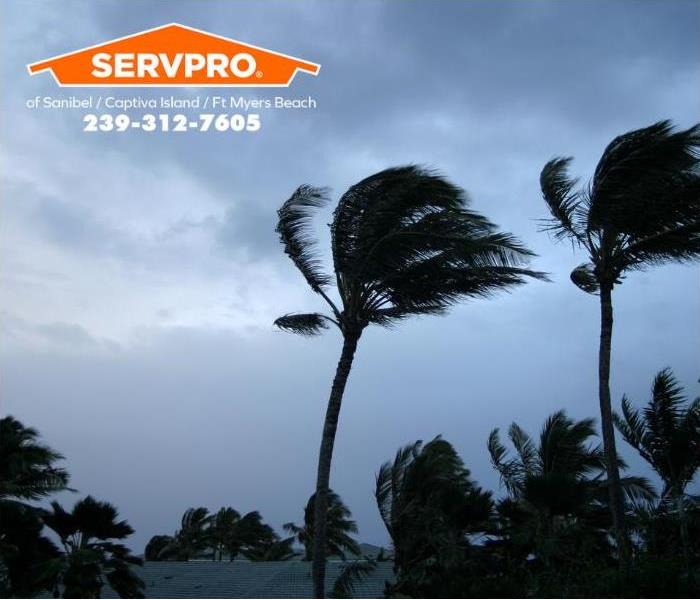 We respond to storm damage emergencies 24/7 in Lee County.
We respond to storm damage emergencies 24/7 in Lee County.
Our local Sanibel/Captiva Island/Fort Myers Beach teams are storm damage restoration leaders in Lee County. Captiva, Florida, is no stranger to hurricanes, which can cause devastating damage to commercial properties. From wind-shattered windows to storm surge flooding, businesses face extensive cleanup and costly repairs after the storm passes.
Hurricanes often cause severe water intrusion, leading to soaked flooring, damaged walls, and compromised inventory or equipment. High winds can strip away roofing materials, leaving businesses vulnerable to further damage from subsequent rains.
Business owners should prepare before the storm to mitigate damage. Securing windows with storm shutters, elevating critical equipment, and ensuring proper drainage can reduce the risk of destruction. When disaster strikes, our team of professionals provides a lifeline. Our highly trained technicians respond quickly to assess damage, extract water, and begin restoration.
With a streamlined insurance claims process and the ability to handle commercial properties of all sizes, we help businesses reopen faster after a storm. Preparing ahead and partnering with a trusted restoration company ensures a smoother recovery in the face of Florida’s unpredictable hurricane season.
Storm Damage Services
- 24/7 Emergency Storm Damage Services
- Commercial Large Loss
- Disaster Recovery Team®
- Small businesses, Retail, and Restaurants
- Hospitals, Universities, Hotels, and Hospitality
- Municipalities and Government Property
Call Us Today!
SERVPRO® Team Zubricki is proud to be SERVPRO’s Franchise of the Year 2024.
When your business or home in Captiva needs storm damage restoration services, our local Sanibel/Captiva Island/Fort Myers Beach teams are Here to Help®. Contact us today.
SERVPRO® franchises are independently owned and operated.
Generator Safety Tips for Estero Island Residents?
12/10/2024 (Permalink)
 We restore storm damage 24/7 in Lee County.
We restore storm damage 24/7 in Lee County.
Our local Sanibel/Captiva Island/Fort Myers Beach teams are leaders in storm damage restoration services on Estero Island. Many residents rely on generators as a back up power source when there is a power outage. Using a portable generator safely as a backup power source requires careful attention to guidelines to avoid accidents and injuries. Here are some generator safety tips:
First, always operate the generator outdoors, far away from windows, doors, and vents, to prevent carbon monoxide poisoning, which can be deadly.
Never use it in enclosed spaces, such as garages or crawl spaces. When setting it up, ensure the generator is on a dry surface to avoid electrical shocks and use a canopy or cover designed for generator use in wet conditions.
Always plug appliances directly into the generator using heavy-duty, outdoor-rated extension cords, and avoid overloading the generator by checking its wattage limits. Turning the generator off and allowing it to cool down before refueling is important to prevent fire hazards.
Finally, have working carbon monoxide detectors in your home while using a generator for an added layer of safety. Regular maintenance and proper storage are essential for safe operation.
Call Us Today!
If your home or business on Estero Island has storm damage, our Sanibel/Captiva Island/Fort Myers Beach teams are Here to Help®.
SERVPRO Team Zubricki is proud to be SERVPRO's Franchise Of The Year for 2024.
SERVPRO® franchises are independently owned and operated.
Tips for Staying Safe While Waiting for Help to Arrive After a Storm on Captiva Island?
12/3/2024 (Permalink)
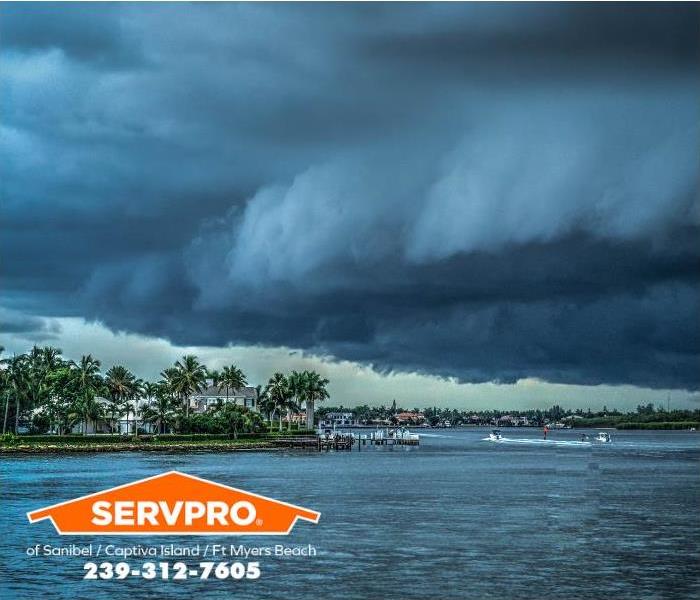 We are storm damage restoration leaders in Lee County.
We are storm damage restoration leaders in Lee County.
Our local Sanibel/Captiva Island/Fort Myers Beach teams restore are storm damage restoration leaders. There are several important steps you can take to ensure your safety after sustaining storm damage:
Ensure Safety First
Your safety should always be the top priority. If the structure is compromised, avoid entering the home. Watch for hazards such as downed power lines, broken glass, or exposed electrical wiring. If the damage is severe, it may be safer to wait outside or in an undamaged part of the property.
Prevent Further Damage
If it’s safe to do so, take steps to prevent additional damage. For example, you can cover broken windows or holes in the roof with tarps or plastic sheeting to keep rain from entering. Shut off the main water, gas, or electricity if you notice leaks or electrical hazards.
Document the Damage
Take photos or videos of the storm damage for insurance purposes. Documenting the extent of the damage can help with the claims process once the restoration begins.
Move Valuables
If possible, relocate valuable items to a safer part of your home to prevent them from being damaged by water, debris, or exposure.
Stay Informed
Keep an eye on weather updates and communicate with your insurance provider and local authorities. Be ready to provide updates to restoration professionals when they arrive.
Call Us!
If your home or business on Captiva Island has storm damage, our Sanibel/Captiva Island/Fort Myers Beach teams are Here to Help. ® Contact us today at 239-312-7605.
SERVPRO Team Zubricki is proud to be SERVPRO's Franchise Of The Year for 2024.
SERVPRO® franchises are independently owned and operated.
Tips For Staying Safe During a Lightning Storm in Sanibel, Florida?
11/19/2024 (Permalink)
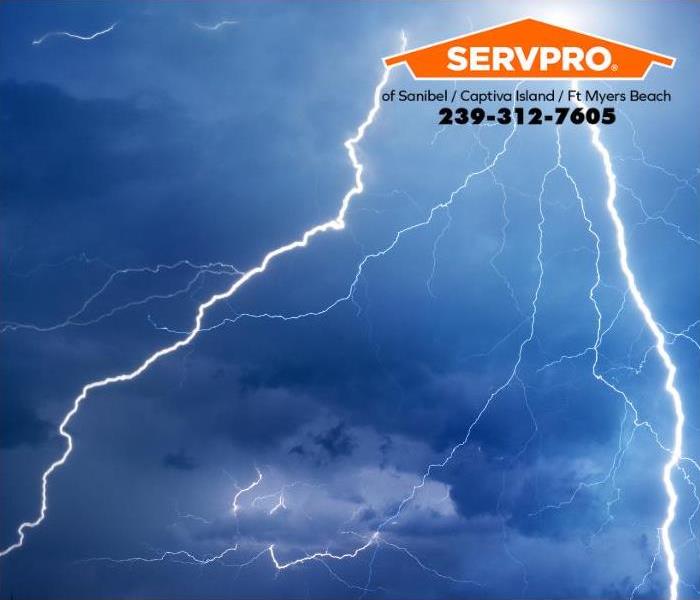 We restore storm damage 24/7 in Lee County.
We restore storm damage 24/7 in Lee County.
Our local Sanibel/Captiva Island/Fort Myers Beach teams are storm damage restoration leaders. Florida experiences thunderstorms and lightning approximately 70 to 100 days a year, so it is critical that residents know how to stay safe during a thunderstorm. Here are some tips from the Florida Division of Emergency Management for staying safe around lightning:
- Have a NOAA All-Hazards Weather Radio and battery backup to receive important weather and other emergency-related warnings. With a NOAA All-Hazards Weather Radio, you can monitor current weather conditions and forecasts for your local area. These radios also have an alert feature which will sound an alarm - followed by important weather information - whenever a watch or warning is issued for your area.
- Inquire if your community is StormReady. StormReady helps community leaders and emergency managers strengthen local safety programs. StormReady communities are better prepared to save lives from the onslaught of severe weather through advanced planning, education and awareness.
- Check the weather forecast before leaving for extended periods outdoors and watch for signs of approaching storms while outside. Postpone outdoor activities if storms are imminent.
- Discuss lightning safety with all members of your household or business.
Call Us!
When your home or commercial business in Sanibel has storm damage, our teams in Sanibel/Captiva Island/Fort Myers Beach are Here to Help. ® Contact us today at 239-312-7605.
SERVPRO® franchises are independently owned and operated.
Staying Safe During a Power Outage Caused by a Hurricane in Sanibel?
11/5/2024 (Permalink)
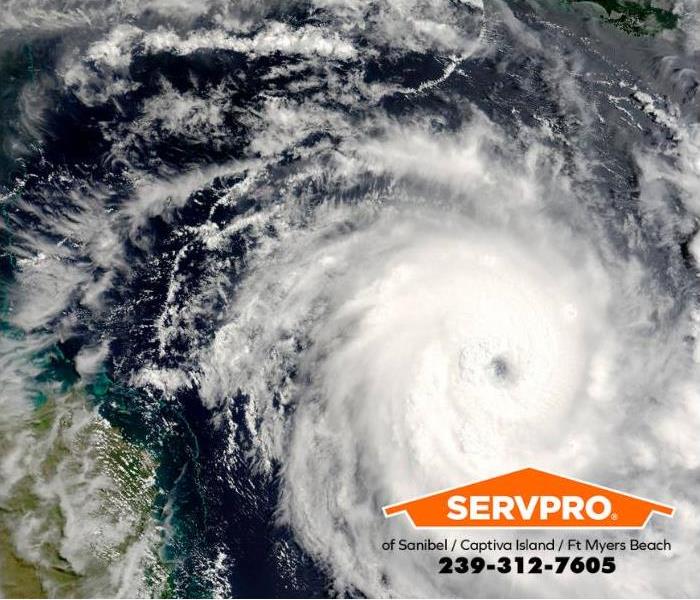 We are trained and certified to restore storm damage in Lee County.
We are trained and certified to restore storm damage in Lee County.
Our local Sanibel/Captiva Island/Fort Myers Beach teams want everyone to be prepared in the event of a hurricane power outage. Power outages during hurricanes are common and can last for days or weeks. Being prepared to keep your household safe and comfortable when the lights go out is essential. Here’s how you can stay safe during a hurricane-induced power outage.
First, ensure you have an emergency supply kit on hand. This should include flashlights, batteries, a battery-powered radio, non-perishable food, bottled water, and any necessary medications. Avoid using candles for light, as they can pose a fire hazard during a dangerous situation.
If you rely on a generator, make sure it’s used safely. Never operate a generator indoors or near open windows, as it can produce deadly carbon monoxide fumes. Place it outside in a well-ventilated area and follow the manufacturer’s guidelines.
Refrigeration is another concern, so keep refrigerator and freezer doors closed to preserve food for as long as possible. Most food will stay safe for around four hours in a refrigerator and 48 hours in a freezer if left unopened.
Finally, listen to local authorities for updates and instructions via a battery-powered radio or smartphone. Staying informed is key to ensuring safety during and after a hurricane-related power outage.
Call Us Today!
When your Sanibel home or commercial business has storm damage, our teams in Sanibel/Captiva Island/Fort Myers Beach are always Here to Help®. Contact us today at 239-312-7605.
SERVPRO® franchises are independently owned and operated.
Tropical Storm Damage: How to Safeguard Your Home on Estero Island?
9/30/2024 (Permalink)
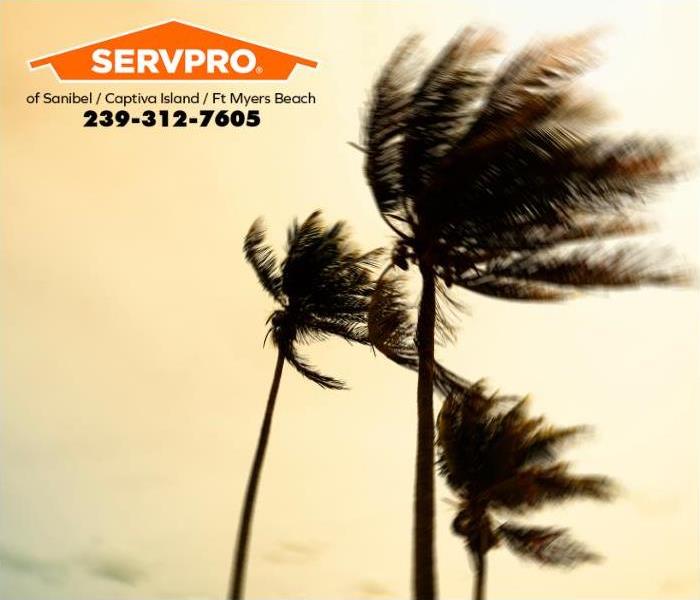 We restore storm damage 24/7 in Lee County.
We restore storm damage 24/7 in Lee County.
Our local teams in Sanibel/Captiva Island/Fort Myers Beach are leaders in storm damage restoration services. Tropical storms on Estero Island can be devastating, bringing with them heavy rain and strong winds and the potential for storm surges and flooding. Preparing your home for such an event is crucial to minimizing damage.
Start by securing the exterior of your home—install storm shutters to protect windows and reinforce doors to withstand high winds. Roof inspections are essential before a storm hits; look for any loose shingles or tiles that could be ripped off during the storm, exposing your home to water damage.
Consider installing hurricane straps to help keep your roof attached to the walls, reducing the risk of it being blown off entirely. Elevating essential utilities like electrical panels and HVAC systems above potential flood levels in areas prone to flooding can help prevent severe damage.
Sandbags around doors and windows can also help keep water out during a storm surge. Finally, having a clear evacuation plan and an emergency kit with essential supplies is vital to ensuring your family's safety. By taking these steps, you can reduce the risk of tropical storm damage and better protect your home and loved ones.
Call Us Today!
When your Estero Island home or commercial business has a storm damage emergency, our teams in Sanibel/Captiva Island/Fort Myers Beach are Here to Help. ® Contact us today at 239-312-7605.
SERVPRO® franchises are independently owned and operated.
Why Are We a Top Choice for Storm Damage Restoration Services in Fort Meyers Beach?
9/17/2024 (Permalink)
 We are storm damage restoration leaders in Lee County.
We are storm damage restoration leaders in Lee County.
Our local Sanibel/Captiva Island/Fort Myers Beach teams respond to storm damage emergencies 24 hours a day, 365 days a year. When a storm wreaks havoc on your property, our professionals will work to restore your home quickly and efficiently. Our process begins with thoroughly assessing the damage to identify all affected areas. This allows us to create a customized restoration plan tailored to your needs.
Next, we immediately address any safety hazards, such as broken windows, exposed wiring, or compromised structures. Our team ensures the area is secure before using advanced water extraction equipment to remove standing water, preventing further damage and reducing the risk of mold growth. We then use industrial-grade dehumidifiers and air movers to dry out the affected spaces, ensuring moisture levels are returned to normal.
After the drying process, we focus on cleaning and sanitizing your home to remove any contaminants brought in by the storm. This includes cleaning surfaces, deodorizing the space, and restoring salvageable items.
Finally, our team will carry out necessary repairs and reconstruction to return your home to its pre-storm condition. Throughout the process, we work closely with you to ensure a smooth, stress-free experience, helping you regain peace of mind after a storm.
Call Us Today!
When your Fort Meyers Beach home or business has storm damage, our local Sanibel/Captiva Island/Fort Myers Beach teams are Here to Help. ® Contact us today at 239-312-7605.
SERVPRO® franchises are independently owned and operated.
Hurricane Evacuation Plan for Pets in Captiva?
9/3/2024 (Permalink)
 We restore storm damage 24/7 in Lee County.
We restore storm damage 24/7 in Lee County.
Our local team in Sanibel/Captiva Island/Fort Myers Beach wants everyone to be prepared to evacuate during a disaster when necessary. Here are some tips for assembling a portable pet disaster supplies kit from FloridaDisaster.org:
Whether you are away from home for a day or a week, you will need essential supplies to care for your pet. Keep items in an accessible place and store them in sturdy containers that can be carried easily (duffle bags, covered trash containers, etc.). Your pet disaster supply kit should include the following:
- Medications and medical records (stored in a waterproof container) and a first aid kit
- Sturdy leashes, harnesses, and carriers to transport pets safely and ensure that your animals cannot escape
- Photo of you and your pet(s) – in the event you are separated from your pet, having an updated photo with your pet will help validate pet ownership
- Food, potable water, bowls, cat litter/pan, and can opener
- Information on feeding schedules, medical conditions, behavior problems, and the name and number of your veterinarian in case you have to foster or board your pets
- Pet beds and toys, if easily transportable
Call Us Today!
When your home or business has storm damage in Captiva, our local teams in Sanibel/Captiva Island/Fort Myers Beach are Here to Help. ® Contact us today at 239-312-7605.
SERVPRO® franchises are independently owned and operated.
Rebuilding After the Storm: Top-Quality Hurricane Damage Restoration Services in Sanibel, Florida?
8/20/2024 (Permalink)
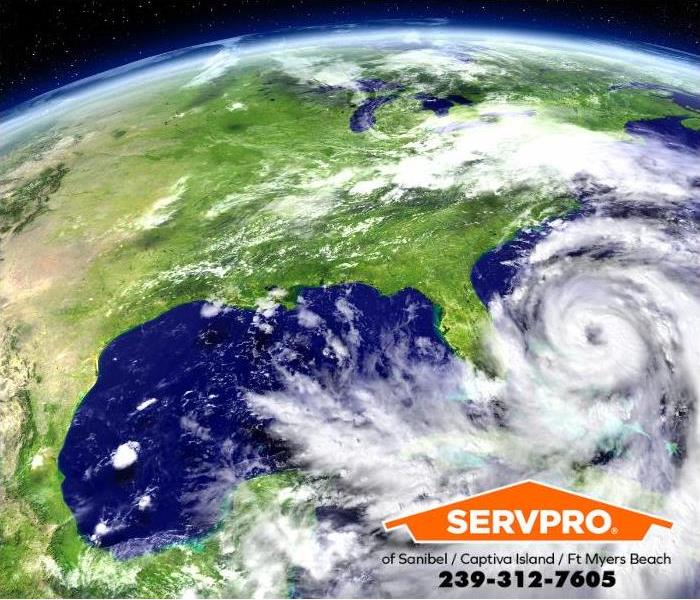 We are leaders in storm damage restoration services in Lee County.
We are leaders in storm damage restoration services in Lee County.
Sanibel, Florida, is no stranger to the devastating impacts of hurricanes. When a hurricane strikes, the aftermath can severely damage homes and businesses, requiring immediate and professional restoration services. Our local teams in Sanibel/Captiva Island/Fort Myers Beach understand the urgency and complexity of hurricane damage, and we are here to help you recover swiftly and efficiently, no matter how extensive the damage may be.
Our 24-hour emergency service ensures we are always available when disaster strikes, providing a fast emergency response time to minimize further damage. Our highly trained technicians are experts in hurricane damage restoration, with the skills and knowledge to handle any situation. We are a trusted leader in the restoration industry, known for our reliability, professionalism, and commitment to excellence.
As an independently owned and operated business, we take pride in serving our local community with personalized care and attention. Our advanced restoration and cleaning equipment allows us to tackle even the most challenging hurricane damage cases, from water extraction and drying to structural repairs and mold remediation.
When a hurricane disrupts your life, trust our teams to restore your property to its pre-storm condition. We are dedicated to helping you rebuild and recover, providing top-quality restoration services with compassion and expertise.
Call Us Today!
When your home or business sustains hurricane damage, our teams in Sanibel/Captiva Island/Fort Myers Beach will restore the damage “Like it never even happened.” Contact us today at 239-312-7605.
SERVPRO® franchises are independently owned and operated.
Preparing Your Home for Hurricanes | SERVPRO of Sanibel/Captiva/Ft. Myers Beach
5/14/2024 (Permalink)
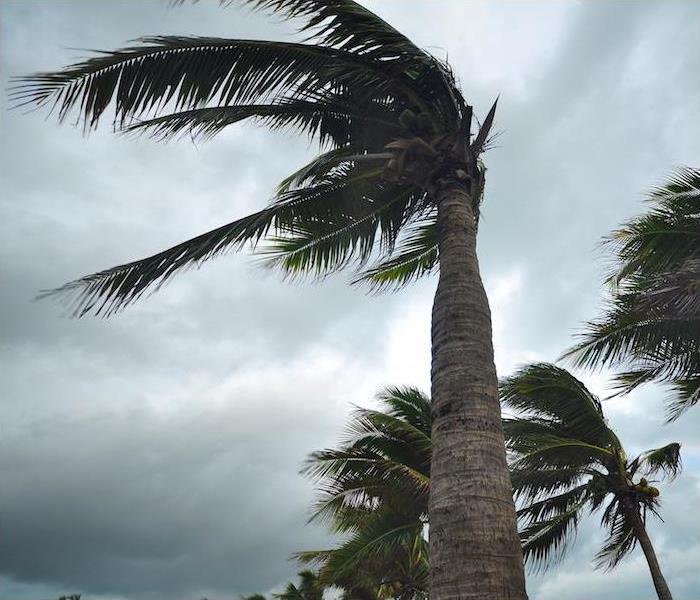 SERVPRO of Sanibel/Captiva Island/Ft. Myers is here for you when disaster strikes.
SERVPRO of Sanibel/Captiva Island/Ft. Myers is here for you when disaster strikes.
Living in the Fort Myers community and surrounding area is a blessing in many ways, but we certainly have some more challenging weather to deal with than other parts of the country. We experience rain, wind and thunderstorms just like everyone else, but we also have to prepare for hurricane season.
Hurricane season starts in June and lasts through the end of November, and another destructive hurricane could make landfall this year.
Preparing for this possibility is crucial in not only your safety, but also in protecting your home from suffering as much damage as possible. Follow our tips below so you can start preparing for this possibility now.
Understanding Our Hurricane Risk
It seems like only yesterday when we emerged from under Hurricane Ian, and many of us are still rebuilding and recovering from that incredibly destructive storm. Since our area is prone to strong storms like this, it is vital that you listen to news outlets and stay current on the forecasts.
Thankfully, hurricanes often appear on radar weeks to days in advance, which gives us all more time to prepare and make action plans. Regardless if you plan to stay put or get out, you need to start making lists and gathering supplies, as well as preparing your home to withstand the rain and wind.
Preparing Your Home
Even though you cannot control Mother Nature, you can still try to hold her off for as long as possible. If you haven’t already, invest in hurricane shutters and strap down your roof with clips or straps to prevent severe weather. This is also the time to purge your yard of unnecessary clutter that could turn into a projectile in hurricane-force winds. Bring in garbage cans, lawn furniture, outdoor equipment and anything else that you can’t secure to the ground.
You also need to prepare your family for either staying put or evacuating. If you are choosing to leave, pack up everything you will need for an extended time away from home. We all know that hurricanes can make returning home really difficult, so plan for a few extra days away.
If you are choosing to stay home, pack up your emergency kit with nonperishable food, safe drinking water, medication, batteries and anything else your family needs to stay safe and comfortable. Move any valuables and important documents up to a higher level of your home and set up a camp to ride out the storm together.
The Recovery Process
Hurricanes are known to cause widespread devastation, usually in the form of wind damage and flooding issues. Standing water can be troublesome to your home as it not only degrades your walls, beams and floors but can also cause extensive mold issues if it is not cleaned up properly.
SERVPRO of Sanibel/Captiva/Ft. Myers Beach is here to help! Our team is trained in large-loss recovery and flood restoration, and we have firsthand knowledge of how to help people recover from hurricane damage. If we are in the eye of another hurricane again this year, remember that we are here when the storm passes.
Flood damage and storm damage can be extensive. SERVPRO of Sanibel/Captiva/Ft. Myers Beach can help.
Tracking Down Leaks When It Rains | SERVPRO of Sanibel/Captiva Island/Ft.Myers Beach
2/21/2024 (Permalink)
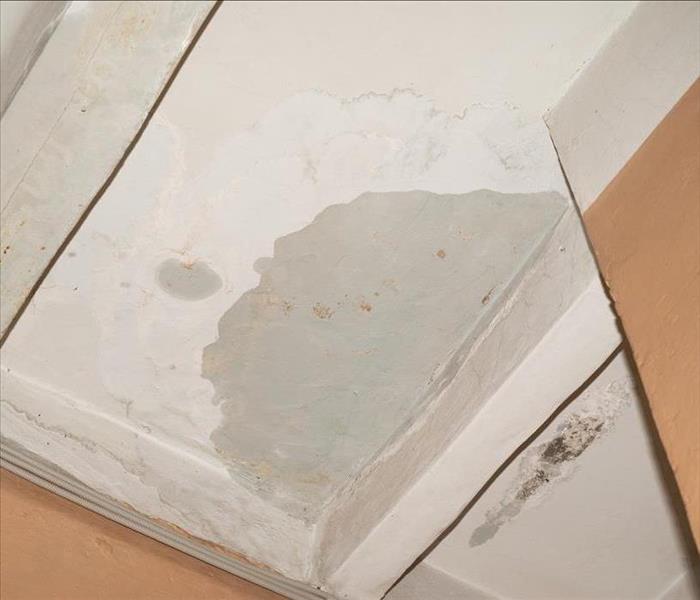 When an unexpected storm invades your home, it can be extremely damaging. Call SERVPRO of Sanibel/Captiva Island/Ft. Myers Beach for help!
When an unexpected storm invades your home, it can be extremely damaging. Call SERVPRO of Sanibel/Captiva Island/Ft. Myers Beach for help!
When it rains, it can really pour around here! While we might be grateful for the rain during dry parts of the year so our lawns and gardens get a drink, you certainly don’t want to be feeling the rain while you are inside your home.
Leaks or home issues can quickly become apparent when it starts to rain, so tracking down the source of the leak right away can help you minimize the potential for water damage. Check out these common places for water to get in when it rains in the Sanibel community.
Windows and Doors
We can all enjoy a nice breeze flowing through our homes now and again, but make sure they are shut tight during a storm or even a gentle rain. Rainwater can easily get through screens and linger on your windowpanes and sills.
That water can leak down your walls and eventually get behind your walls. Once that happens, structural issues can become apparent and mold can even start to grow.
The same goes for your doors! Keep everything shut up tight and address any gapping or cracks around your doors and windows right away. Structural aging of your home can lead to sagging of windows and door frames, and a single gap could be the culprit for a serious rainwater leak.
Your Roof
We all know how important our roofs are, especially during hurricane season. They have the really important job of keeping us safe and dry while Mother Nature rages on outside. That naturally makes them one of the more common places to experience damage. If you notice the leak is coming from somewhere near your ceiling, get up on your roof as soon as it is safe to do so and do some investigating.
A single missing shingle or gap in your roofline could be the culprit that is causing your watery mess. If you don’t see anything on the outside, head into your attic and start scanning the ceiling and walls. Wet insulation, mold growth and the smell of mildew can help point you in the right direction.
Cracked Foundation
Water is sneaky, and it can seep and leak into virtually every area of your home. The tiniest little gap or crack in your foundation can easily allow water to sneak by and flow onto your floors.
If your basement tends to get wet every time it rains or you struggle with flooding issues often, it may be time to do some investigating around your foundation and have any repairs addressed immediately.
Our team will help you do all this and more! We can handle your repairs to prevent the damage from occurring again, but we can also help you clean up and recover from any water damage you experienced. We can restore walls, floors and ceilings, and we will sanitize everything to ensure mold cannot grow in your newly finished space.
We can help you recover from water damage faster. Contact SERVPRO of Sanibel/Captiva Island/Ft. Myers Beach right away
What to do When Sewer Backup Threatens Your Business Property
8/20/2022 (Permalink)
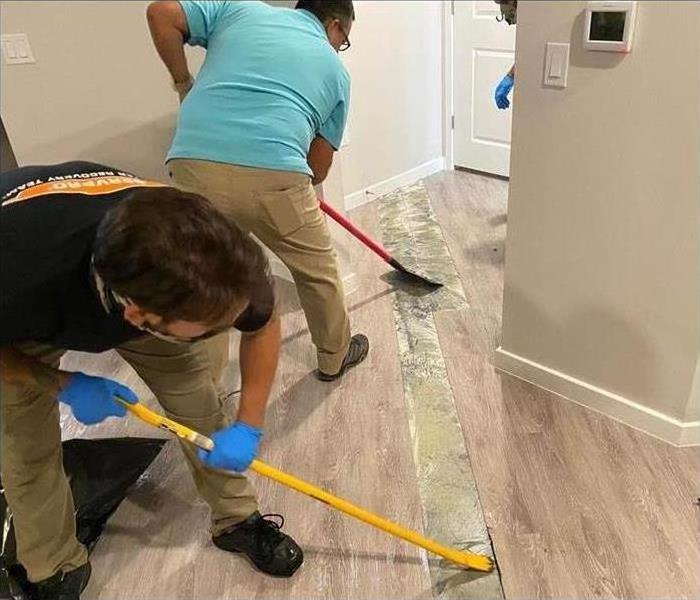 Sewage cleanup in Sanibel, FL.
Sewage cleanup in Sanibel, FL.
If your business is located in Sanibel, FL, it may be at risk for flooding and sewer backup during the next storm. Knowing what preventive measures to take, and what to do if your business does flood, can help you in the event flooding does occur.
Reasons Backup Occurs
There are a number of factors that can play into sewer backup. These may include:
- Excessive storm and rain water which can cause overflow
- Recent construction that changes the landscape and redirects water into the sewer
- Fresh pavement with a new drainage grade can change the runoff flow
- Failure to regularly clean a septic system can cause a backup
If you think there’s a chance your business might face sewer back up with the next storm, it’s best to take preventative measures.
Take Preventive Measures
Flood water is classified as black water because some of it can come from contaminated sources such as a sewer. This means clean-up can require extra sanitation steps. Taking preventive measures beforehand may help mitigate the damage. Ensure then trap plugs are clean, snug, and secure as these can filter debris that may back up in your pips. Some buildings may also qualify for a backwater check valve.
Conduct Cleanup as Quickly as Possible
In the event you do find flooding its best to take care of the cleanup process as quickly as possible. Remember to turn off the electricity to the flooded area before entering. Remove items from the flooded area and be sure to clean and dry them. Because flood water is classified as black water, everything should be sanitized as well. You will also need to clean, dry and sanitize the flooded area after the water has been removed. A professional service may also be able to help.
Flooding from sewer backup can cause a number of problems for your business. This is why it’s important to take preventive measures beforehand. If excessive rain water does lead to sewer flooding at your business, knowing what to do beforehand can help save valuable time.
Will Insurance Cover My Business After a Storm?
7/29/2022 (Permalink)
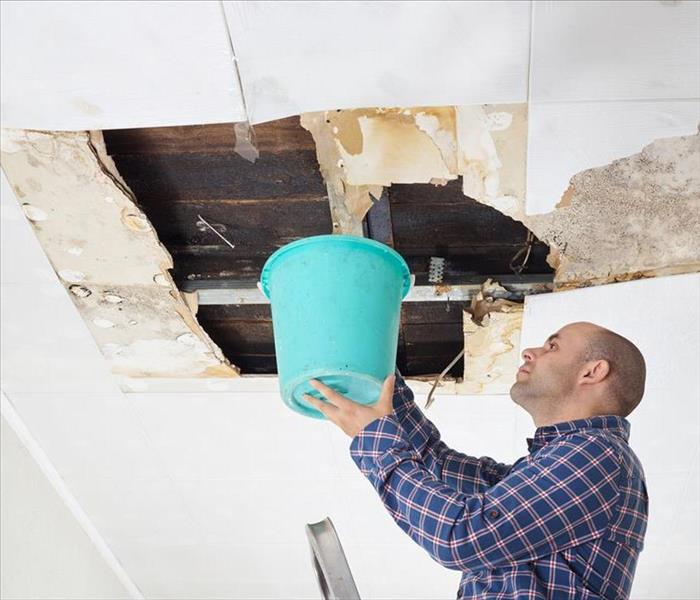 Roof damage due to a storm.
Roof damage due to a storm.
Business owners may find themselves wondering if their property in Iona, FL is covered if the building is damaged by a storm. If you have commercial insurance, the short answer is yes, in most cases. However, it's worth taking a look to see what exactly your storm insurance covers.
What Does a Standard Policy Cover?
Typically, commercial insurance will cover losses or damage caused by:
- Fires
- Wind storms other than hurricanes
- Hail storms
- Tornadoes
If your roof sustains damage from a storm and water gets in the building, most policies will include insurance coverage on this type of water damage if the roof was in good condition prior to the storm.
What Is Not Covered in a Standard Policy?
Most commercial policies will not cover damage from hurricanes, earthquakes or flooding. Water damage caused by rising water or heavy rain will require coverage from a supplementary insurance policy. Sewage backup may also fall into the category of flooding, as heavy rains can cause sewer mains to back up into buildings. If you do not have separate insurance for flooding, consider purchasing it for your property. Flooding can happen in any geographic location, and having coverage available for emergency restoration services is a good idea.
What Are Hurricane and Windstorm Deductibles?
Businesses in coastal areas covered by storm insurance may have a wind damage deductible. Hurricane deductibles apply to damage caused solely by hurricanes. Wind storm or wind/hail deductibles apply to any kind of wind damage. In most cases, the insurance company will determine which deductible will apply to a claim. Deductibles may be a dollar amount or a percentage of the property's value. Options vary by state and are subject to regulations, so be sure to review your policy with your agent if you need information about your insurance coverage.
It's best to know your storm insurance coverage before a disaster strikes. Review your policy with your agent to make sure you are prepared for a weather emergency.
The Cleanup Process After a Flood
5/25/2022 (Permalink)
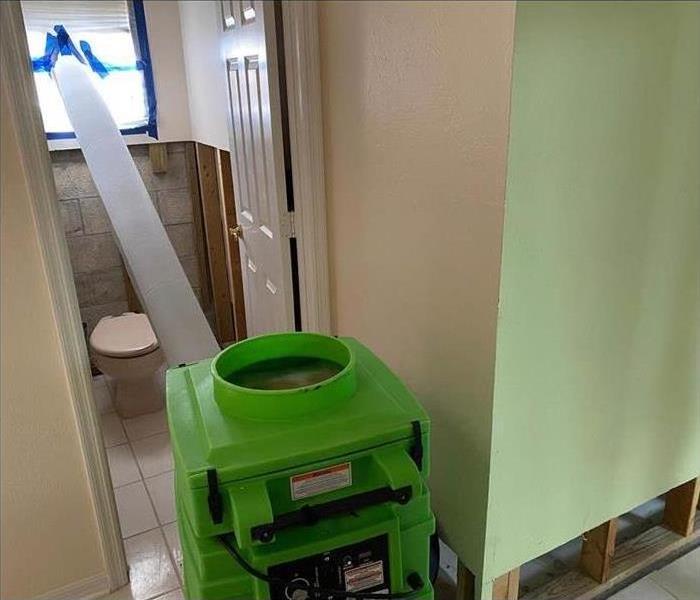 Don't let standing water take over any part of your home.
Don't let standing water take over any part of your home.
After a Flood, How to Clean Up
Dealing with the aftermath of a flood can be devastating for homeowners. Looking at the remnants of their lives as they float contaminated by potential black water is a struggle most people fear. Thankfully, floods do not have to destroy all memories; through content cleaning and the disaster cleanup process, water remediation services in Captiva Island, FL, claim more than you think can be salvaged.
1. Water Excavation
Still, before a company or homeowner can discover what contents are potentially salvageable, they must remove the water from the property. Excavation can begin immediately if the flooding is only located on the property. However, if the area is flooded, you will likely have to wait until exterior water levels recede.
Once water can be removed, it is performed by equipment and not manual means. Services will use pumps and shop vacs to eliminate the water as quickly as possible.
2. Debris Elimination
Following the water excavation, a remediation service will walk the disaster site to process all debris. Anything that is clear trash or unsalvageable will be appropriately discarded. If contents were affected by black water, the service would take special precautions to ensure everyone's safety.
3. Property Drying
When the site is clean of water and debris, the company you choose can begin drying the structure. Drying time will vary based on the extent of the flooding. The team will use fans, air movers, and dehumidifiers to help speed the process along.
4. Content Cleaning and Restoration
Any items that can be salvaged will likely be moved offsite to be cleaned and treated. The restoration company will focus on restoring the house to pre-disaster conditions by installing new drywall, flooring, etc.
Dealing with the aftermath of floods is about more than content cleaning. With the help of mitigation service, homeowners can successfully navigate the cleanup and restoration process.
Understanding Mold in Your Business
5/5/2022 (Permalink)
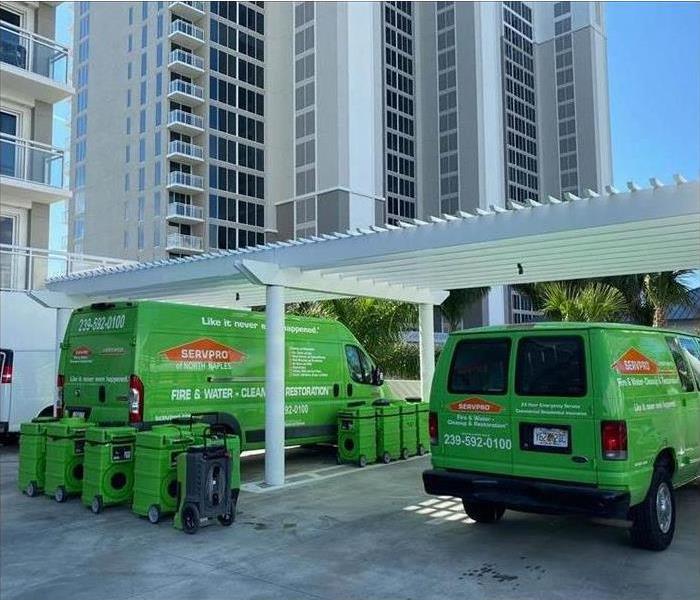 If you are in need of a fungus cleanup for your business in Sanibel, FL it is important to take the proper steps to remove the mold properly.
If you are in need of a fungus cleanup for your business in Sanibel, FL it is important to take the proper steps to remove the mold properly.
Understanding Mold in the Workplace
Mold growth can appear on damp surfaces within 24 to 48 hours. Mold reproduces by tiny spores that travel through the air. Once they land in a new location with moisture, they will start to destroy your building in Fort Myers, FL. This can cause a lot of expensive damage. Here are some questions that you can use to understand this fungus.
Why Is There Mold?
Buildings can develop mold growth after a storm that causes flooding. Some of the big problems that occur during storms that lead to mold include:
- Flooding
- Sewage backups
- Roof leaks
- Flooded basements
- Open windows
- Foundation problems
How Do You Dry a Building?
The best way to dry your building is to hire a storm restoration company. Otherwise, you can do this on your own with some bleach, fans, and dehumidifiers.
What Do You Need To Clean It?
You will need personal protective gear to clean mold yourself, such as gloves and a mask. Aside from this, you will need standard cleanup items, including buckets, scrub brushes, brooms, trash bags, shop vacs, and sponges. Finally, you will need something to kill the mold, like a detergent or bleach.
What if You Have Health Problems?
Everyone is regularly exposed to mold spores inside and outside of buildings. However, standing water makes the risk from mold spores much greater, so it is better for people who have health problems to avoid working inside buildings that have recently experienced flooding.
How Can You Prevent Mold in the Future?
It is not possible to remove all mold growth from your business. However, there are many ways that you can limit the amount of mold that grows in the future. The best methods include stopping any leaks, keeping your business clean, keeping surfaces dry, and routinely disinfecting areas at risk for mold.
While bacteria may be the first contaminant on your mind after a storm floods your business, you should also be concerned about mold. This fungus can do costly damage, so you need to take the proper steps to dry your building and prevent mold in the future.
After the Flood: Make the Most of Your Insurance Claim
1/5/2022 (Permalink)
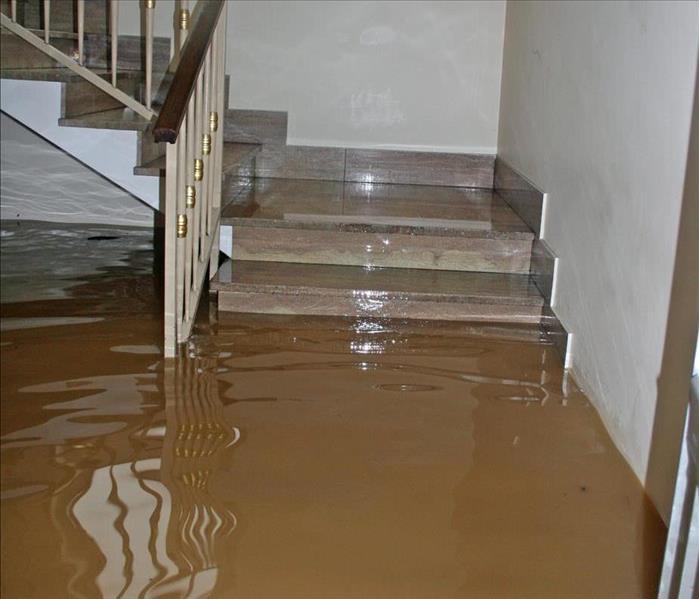 Flood damage in Estero Island, FL.
Flood damage in Estero Island, FL.
Flood Claim
Now that the flood waters have receded, it’s time to survey the damage and take steps to restore your property. As the holder of a flood insurance policy, you are already ahead of the curve—but there still may be significant work to be done before you can collect on a flood claim. Here are some steps that can help guide you through the process in Estero Island, FL.
1. Stay safe. Take every precaution to be certain your home is safe to enter and that there is no threat of further flooding, electrical mishap or collapsing infrastructure. Assume that water is unsafe for human consumption.
2. Contact your insurance company. Contact your insurance claims adjuster as soon as possible. Provide him or her with cell phone and/or email contact information so you will be readily available for an onsite visit.
3. Document the damage. Take photos of the damage to document your loss. If you have pictures of the areas prior to the flood, it would be useful to have them on hand for comparison.
4. Start the cleanup. Begin the cleanup process and call a restoration specialist in Estero Island, FL, if needed. If the adjuster has not yet made his or her assessment, be sure to note everything you intend to include on the flood claim. Make a list of lost and damaged items and include dates of purchase, estimated values and receipts, if possible.
5. Retain evidence. Keep any damaged materials you may remove from the house as the adjuster may need to see them for proof of loss purposes. If possible, store these damaged materials outside on your property.
6. Work with your insurance company. Once the adjuster arrives and finishes the assessment, you will likely be asked to sign a proof of loss statement that will follow specifications as set forth in the insurance policy.
Be sure to file your flood claim within 60 days of the actual flood event. By following these steps, you can be assured of the greatest possible chance for a successful insurance settlement.






 24/7 Emergency Service
24/7 Emergency Service


















